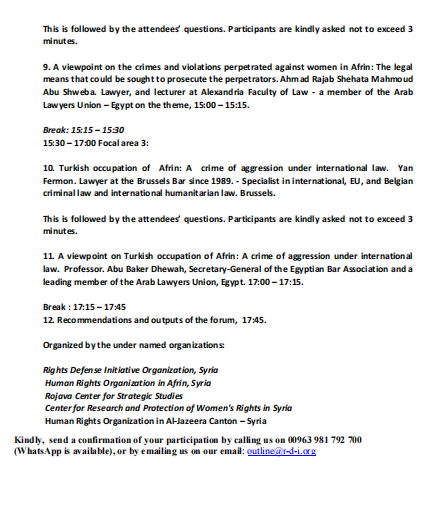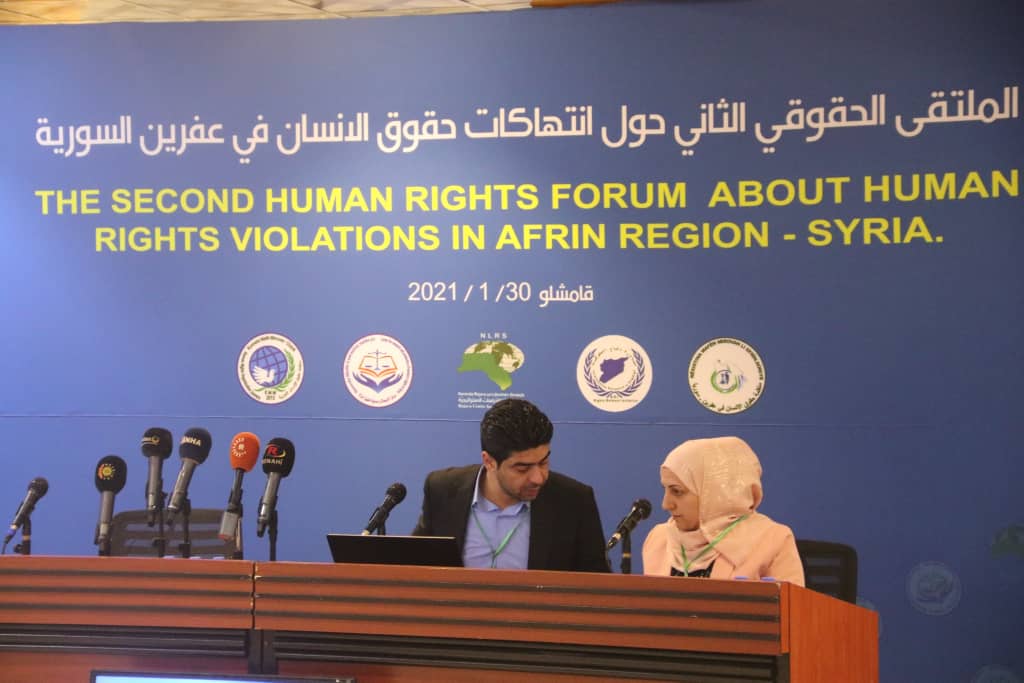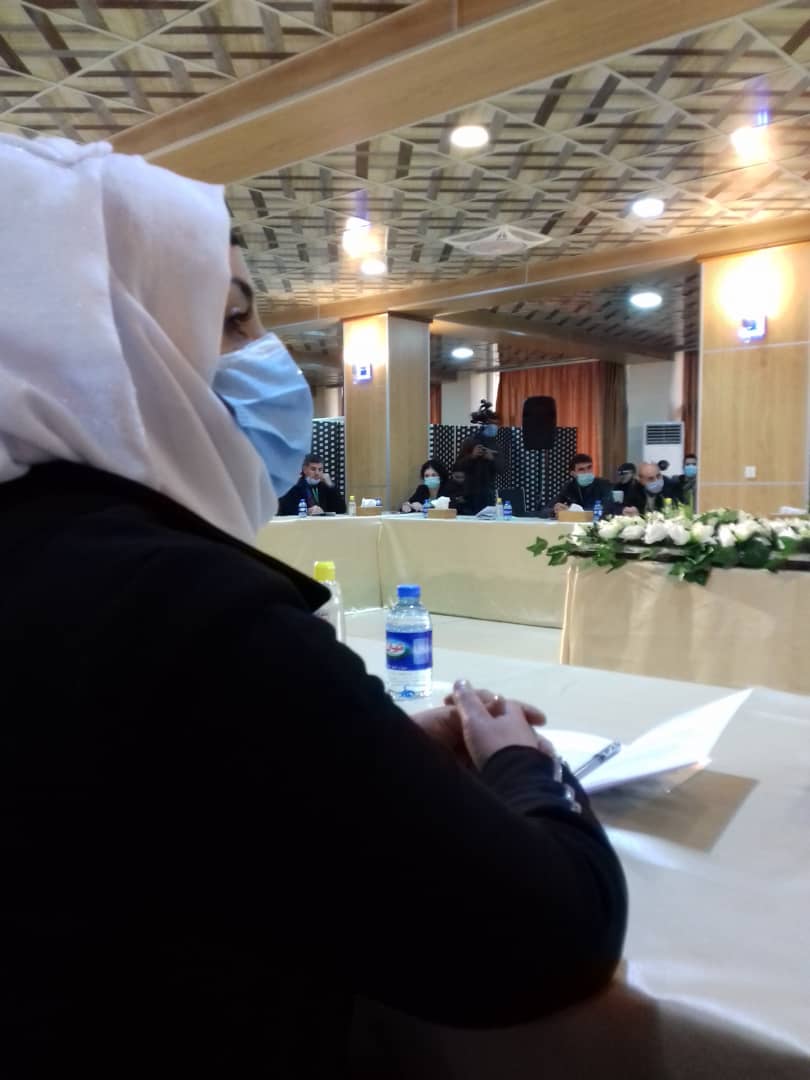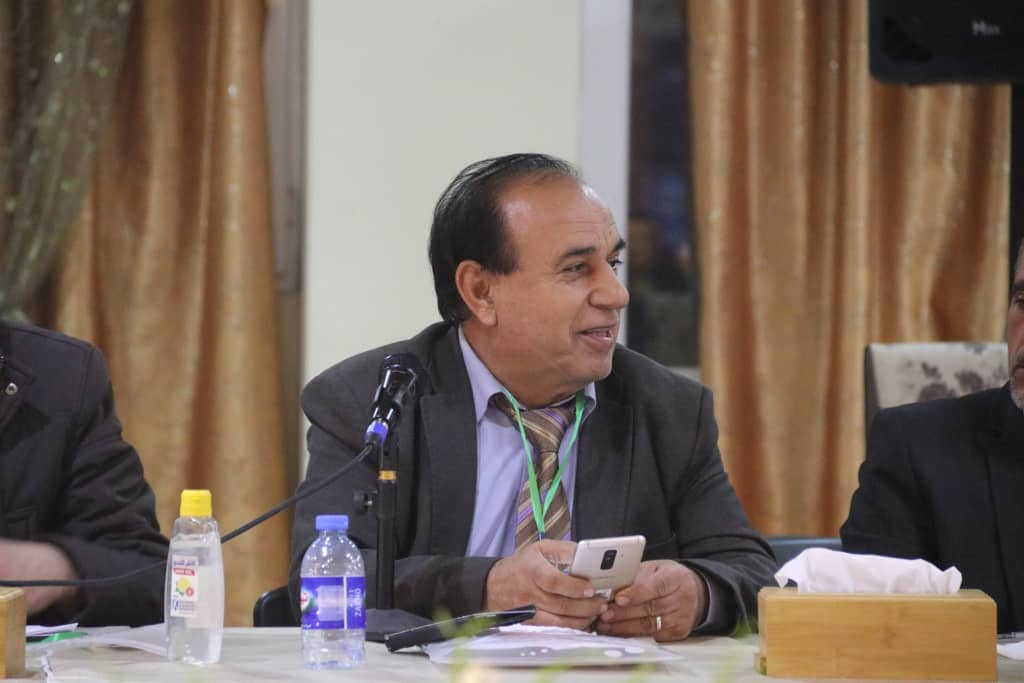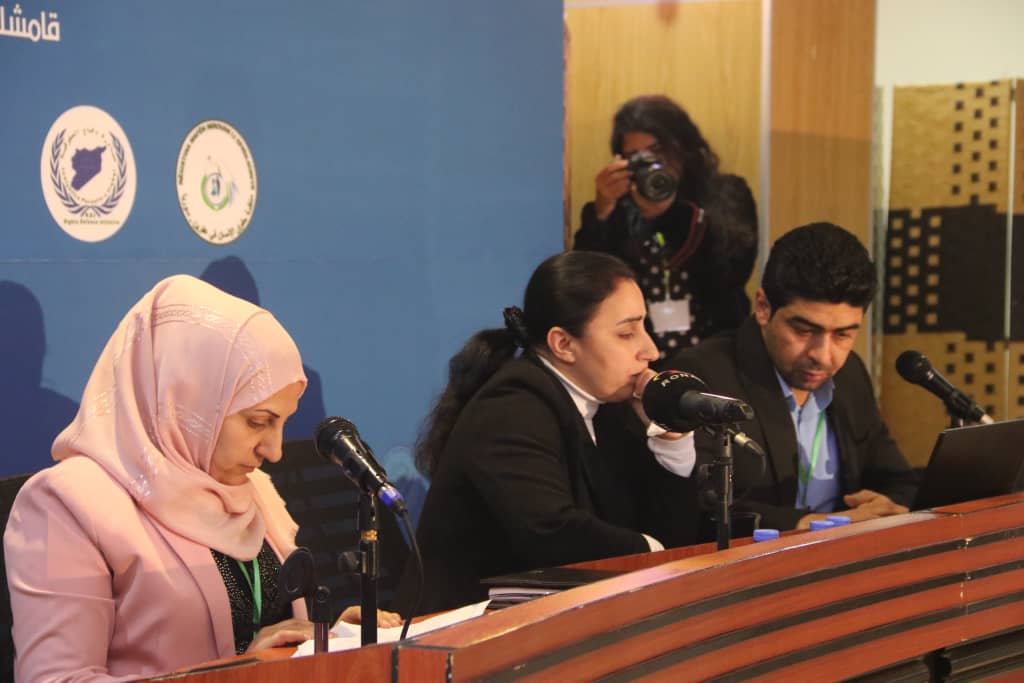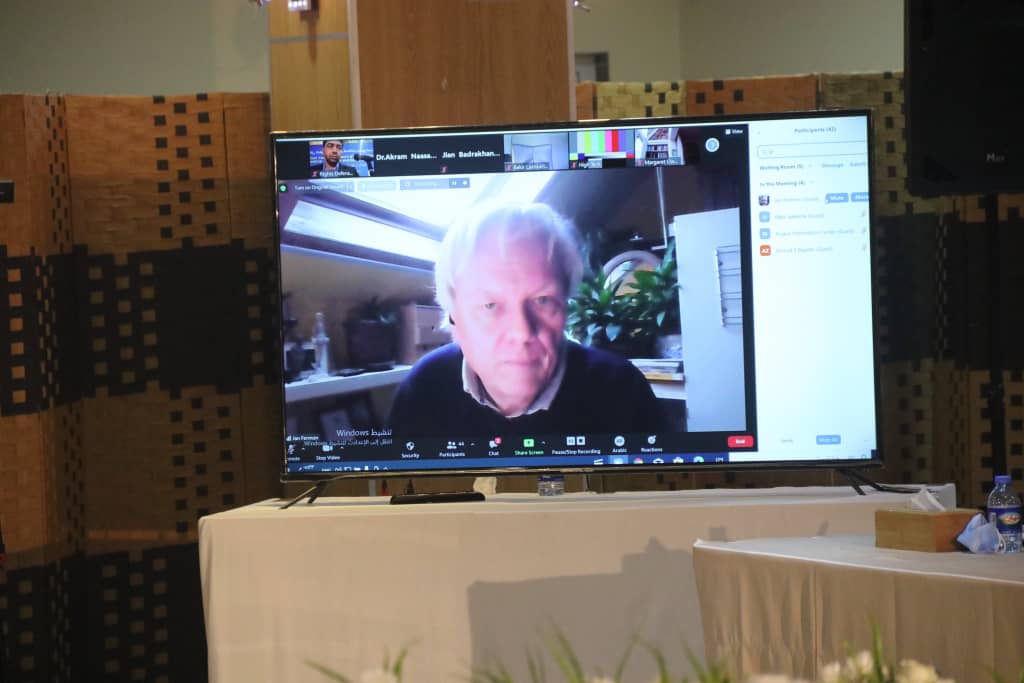On January 30th, there will be a conference on Human Rights Violations in the Afrin Region. @RojavaIC will be attending, and we will tweet the Zoom portal once it is sent out.
To follow the live conference of the human rights situation in Afrin, open the link below. https://www.facebook.com/nrls.rojava/videos/218082393365489/
Ibrahim Sheko reports that there was 35 kidnappings of women in 2020, numerous forced marriages, and of 25,000 yezidi people who lived in the Afrin region, they fled to Europe after the start of the war.
Afrin region had a population of 300,000 people before the war, a majority of Kurds and a minority of Yazidis. The war made 100,000 people flee the region, but Afrin remained a safe haven until the Turkish invasion began in 2018.
Turkey announced its successful occupation in March 2018, and began changing the demographics of the region by renaming streets, imposing language laws against the Kurds, and targeted infrastructure. 80% of the population was displaced and replaced by Idlib settlers.
498 civilians were by Turkish war planes, and nearly 1000 people were kidnapped and their families were forced to pay ransom. Among the kidnapped, women and children were tortured, including journalists. Of the kidnapped, some committed suicide.
The conference is showing footage of the Afrin region during and after the occupation. Scenes include civilians fleeing on foot, scenes of torture committed, and destruction of property.
Journalist and human rights activist Dr. Ghassan Ibrahim begins to speak about the implications of the Turkish occupation. He is speaking about the effect of the forced demographic change.
He pleads that the UN and US should do more to prevent the demographic change. The example of the Turkish occupation will encourage other countries to come to Syria and stake their claim.
Two witnesses from the Afrin region now give their personal testimony on their experiences with the Turkish occupation. The first woman to speak tells of the horrific conditions she witnessed inside a prison controlled by extremist factions.
"While I was released from the prison eventually, many others remained there in solitary confinement, subjected to torture every night."
The next witness of the Afrin occupation relates the story of taking refuge inside a school in Tel Rifat, and seeing her son and other children killed by shellings. Now, her other son refuses to go to school due to trauma. This event happened around December 2nd, 2019.
She asks for restoration of her rights and the rights of her community to be restored, and wishes to return to her home after those accountable are held responsible.
The third witness, Mohammed Jamil, tells of how his neighbors came to his home during the shellings, looking for safety. Everyone was trying to flee the region by car or foot, while the city of Afrin was being shelled.
He paid over 600,000 Syrian Pounds to a smuggler to get him and his family into Aleppo, but during the confusion of being smuggled at night, his group came under small arms fire, he was wounded, and taken to a hospital ran by the militia groups and arrested.
"The Turkish state intentionally targeted civilians and infrastructure, like the water stations. Theses actions continue today, and are war crimes. "
After a break, we return with Dr Azad Deewanee talking about the crimes committed by Turkey and its militias in the scope of International Law.
Dr. Azad discusses the population before the invasion, with 98% identifying as Kurdish. The President of Turkey, Erdogan, supports Islamic groups all over the world and used his political party to help the Syrian National Army, that contains a number of extremist jihadist groups
Some groups are supportive of Al Qada, and contain former ISIS militants. The Grey Wolves are an ultra nationalist group that has sympathizers with the Turkish Special Forces who took part in the Afrin Invasion.
ISIS flags and Al Nusrah flags were flown at a rally in the center of Afrin, as well as in Sere Kanye during the protests against the French President Macron after his comments in 2020. The groups are not local to Afrin, they follow the Turkish leadership.
During the Afrin and Sere Kanye invasion, SNA groups were instructed by a religious leader to read religious passages decrying infidels, and President Erdogan used similar sentiments, claiming the Turkish Army and its affiliates were "the Army of the Prophet."
The Turkish government did not provide any military basis, like cross border attacks or armed instigation, for the invasion of Afrin. These are documented by foreign journalists like the BBC and international NGOs.
Dr. Azad presents the official language of the internationally agreed upon terms for what a "war crime" is and how the targeting of any civilian populations is an offense. Ethnic cleansing and war crimes can amount to genocide against a population.
President Erdogan misconstrued the true numbers of the population statistics in Afrin, blatantly disregarding the fact checked numbers provided by a number of journalists and international organizations.
Dr Azad argues that President Erdogan's systematic plans to invade Afrin, including the Turkish military's involvement and targeting to of civilians, and continuous displacement of native populations amounts to an ethnic cleansing.
The UN Commission on Human Rights avoid using such terminology as "war crimes" and "ethnic cleansing" because it creates an uncomfortable relationship between nations, says Dr. Azad.
Bakir Lashkari suggests that the Kurdish issue be brought to the EU, that Afrin witnesses be sent to the White House of Joe Biden, and advancing the issue of the Kurdish people around the world through lobbyist groups.
Muhammed Sheeraz Talabani comments that he and his group are documenting the crimes and atrocities being committed across the region in Syria and Iraq, including the use of chemical weapons, and asks Dr. Azad to continue his work.
Dalya Ahmed comments that it is difficult to bring these offenses to the courts because of relationships between the UN members and NATO allies.
Ahmad Z Bajalan of the International Criminal Court says that the ICC needs the help of the UN Security Council to bring Turkey and other factions who commit crimes to the court.
Ayman Okail begins his lecture on the human rights violations and his civil society organization's attempts to document the actions of Turkey and its affiliates. He wishes to bring these documents to Geneva.
Mr. Okail's focus is about the use of prohibited weapons and tactics, including the use of chemical weapons against civilians. He urges civil society organizations to force Turkey to speak out about these actions.
"Through the reports, we must pressure the international committees and Turkey to respond to these war crimes," says Mr. Okail.
The conference on Human Rights Violations in Afrin returns with Majdolin Hassan, Member of the Women's Advisory Council for the UN Special Envoy for Syria and Head of the Syrians for Detainees and Abductees.
"There is a need for psychological services for the people to heal from the tragedy. The Syrian government must join the international community so they can be held accountable by the courts and the people of Syria can get their needs met."
Bakir Lashkari asks Ms. Majdolin Hassan about the silence of the Syrian and Turkish governments. She says that they have the same fear of the Kurdish population, and its in their interest to ignore the crimes they are accused of.
Ms.Majdolin Hassan says that we must trust the reports about the crimes, and every nationality has the right to decide its own fate. Afrin was mostly Kurds, but now is only about 20% Kurdish.
The Syrian Government may not recognize the Kurds as Syrian, but they have the right to identify as Syrian and Kurdish with representation in their government.
An attendee asks Majdolin Hassan how the Afrin issue and the files going to the International Court can be viewed as women's issues.
She responds that any woman can testify to the courts or give files to the courts so they are represented, and they can go to many international courts. This is similar to cases in Sudan.
Another conference attendee asks Majdolin Hassan, how can the people of North and East participate in international courts if they have been forbidden by international agreements, specifically women.
Majdolin Hassan responds that has been no international decision to protect women in the international community, only in war situations. There is more than 50% participation in NES politics by women, and they should participate in the international communities.
Margaret Owens uses her time to raise the issue of sexual violence against women and discrimination, and how difficult it is to document cases of rape when the victims are hesitant to speak out.
Ms. Owens talks about the women who fled Afrin and are now living in horrible conditions elsewhere in NES, hoping that these women will speak to the panels documenting their plight.
Majdolin Hassan responds to Ms. Owens, saying that her cause is trying to support these womens and hear their stories. Women are empowering themselves and the UN should encourage this work. The women's efforts should be shared with the rest of Syria,
A conference attendee discusses the fact that the accomplishments of the women in NES are the same women who were and are suffering in Afrin at the hands of the Turkish government. The Syrian Government are ignoring the actions of Turkey, and they are just as responsible.
Majdolin Hassan responds that the yes, the Syrian government is morally culpable, but they are unable to defend Afrin. While they guilty of war crimes, they have no care about what happens in Afrin.
Ahmad Rajab Shehata Mahmoud Abu Shweba, a lawyer, lecturer at Alexandria Faculty of Law and a member of the Arab Lawyers Union starts his discussion on the legal aims of charging the aggressors in Afrin.
The acts committed in Afrin by the aggressors are all examples of war crimes, and the UN agencies and Security Council must not separate the crimes from its sponsors in Turkey. The victims who are in the reports have a good chance of winning their case, but the problem lies with
the UN Security Council and the politics of its members. The Kurds suffer at the hands of Turkey; the death of women and children, kidnappings, sexual violence, they are suffering for the world.
Going to the Security council will be a solution for the Kurds and having a trial against the aggressors. The Syrian government doesn't allow its people to go to international courts, but the world can see the files.
Yan Fermon lawyer at the Brussels Bar since 1989, Specialist in international, EU, and Belgian
criminal law and international humanitarian law, brings us back after a short break to discuss the legality of trying aggressors in court.
criminal law and international humanitarian law, brings us back after a short break to discuss the legality of trying aggressors in court.
Mr. Fermon discusses the legal precedent of the UN charter and the articles of the charter that deal with crimes of aggression and crimes against peace, as established after World War 2 and in the 1970's.
He says that the crime of aggression is the mother of all crimes that all other acts are derived from. War crimes and crimes against humanity stem from crimes of aggression. Members of the UN Security Council have violated these statutes.
The UN charter explicitly states that it is forbidden to use means of force to settle international disputes, and although acts of self defense are permissible, all operations must cease once the Security Council makes resolutions or takes action.
Turkey's claim of self defense against the Syrian State is without basis, as there are no recorded attacks from the Syrian State against Turkey, says Mr. Fermon. Similarly, Turkey can be held responsible for having motive to break the UN articles by their pattern of escalation.
The UN articles stipulate that it is not the soldiers who are culpable for the crimes that are committed, but rather the political leaders who organize and cause the chain of events that make the crimes, as established in precedent after World War 2.

 Read on Twitter
Read on Twitter

